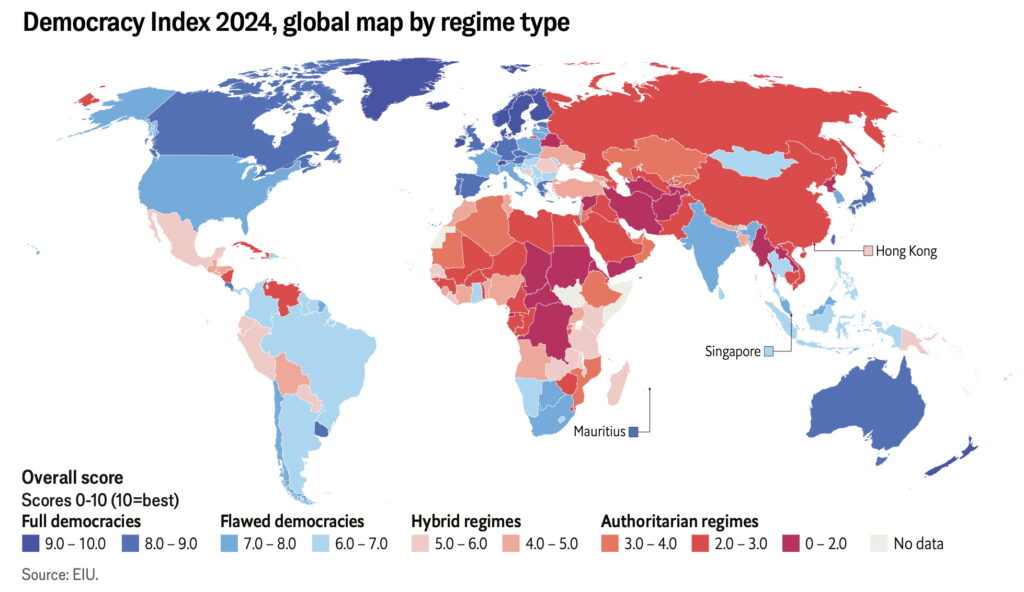For the first time, the Economist Democracy Index is ranking Estonia as a “full democracy” rather than a “flawed” one as it has done in the past.
The Economist Democracy Index 2024, compiled by the Economist Intelligence Unit, a division of the Economist Group that publishes its namesake magazine, lists Estonia 21st in this year’s Democracy Index (same as Spain) with the democracy score of 8.13.
Estonia has normally been ranked fairly well in the past, but, up until this year’s index, Estonia had been classified as a “flawed democracy”, meaning it’s a country where elections are fair and free and basic civil liberties are honoured but may have issues. These countries can have significant faults in other democratic aspects, including underdeveloped political culture, low levels of participation in politics and issues in the functioning of governance.

Now, however, Estonia has graduated to being a “full democracy” according to the index, meaning it’s a country where civil liberties and fundamental political freedoms are not only respected but also reinforced by a political culture conducive to the thriving of democratic principles. These nations have a valid system of governmental checks and balances, an independent judiciary whose decisions are enforced, governments that function adequately, and diverse and independent media.
The Baltics exceed the regional average
The Czech Republic and Portugal were also upgraded from “flawed” to “full” democracies in the 2024 index.
“Not since the Czech Republic was demoted to a ‘flawed democracy’ in 2014 has Eastern Europe /—/ had a ‘full democracy’. Now it has two, after the Czech Republic and Estonia moved up the rankings into the ‘full democracy’ camp,” the index points out.
However, the index doesn’t specifically address what has changed in Estonia’s democracy and what was the trigger that promoted the country to a “full democracy”. Estonian World reached out to the Economist Intelligence Unit, asking for clarification, but hasn’t heard back.
The index does mention, however, that “[a]t 7.43, the average index score for the countries of central Europe (Croatia, the Czech Republic, Hungary, Poland, Slovakia and Slovenia) and the Baltics (Estonia, Latvia and Lithuania) significantly exceeded the overall regional average, which is weighed down by the ‘authoritarian regimes’ that predominate further east”.

Only 6.6% of the world’s population live in “full democracies”
Looking at the immediate neighbours of Estonia, Sweden is ranked third with the democracy score of 9.39; Finland sixth (9.3), both “full democracies”; Latvia 33rd (7.66); Lithuania 36th (7.59), both “flawed democracies”; and Russia 150th (2.03), “authoritarian”.
The most democratic country on earth, according to the index, is Norway (9.81), followed by New Zealand (9.61).
The Economist Democracy Index covers 167 geographies – 165 countries and two territories – of which only 25 are classified as “full democracies”. That is only 15% of the countries ranked in the index, and just 6.6% of the world’s population. In addition, 46 countries are classified as “flawed democracies”, 36 as “hybrid regimes” and a whopping 60 countries as “authoritarian regimes”.
“Four years after the start of the COVID-19 pandemic, which led to a rollback of freedoms around the globe, the 2024 results point to a continuing democratic malaise. Only a minority of countries (37) improved their index score in 2024, and the margin of improvement for most was small and often from a low base,” the EIU says in the index.

A majority of countries stay stagnant or worsen
“A far larger number (83) registered a decline in their score, and some of these deteriorations were substantial. The scores for the other 47 countries stayed the same. That means that the quality of democracy in 130 countries of the total of 167 covered by the index either worsened or made no improvement.”
The Economist Democracy Index, published by the Economist Group, is an index measuring the quality of democracy across the world. This quantitative and comparative assessment is centrally concerned with democratic rights and democratic institutions.
The index is based on 60 indicators grouped into five categories, measuring pluralism, civil liberties and political culture. In addition to a numeric score and a ranking, the index categorises each country into one of four regime types: full democracies, flawed democracies, hybrid regimes and authoritarian regimes.
The first Democracy Index report was published in 2006. Reports were published every two years until 2010 and annually thereafter. The index includes 167 countries and territories, of which 165 are sovereign states and 164 are UN member states.


